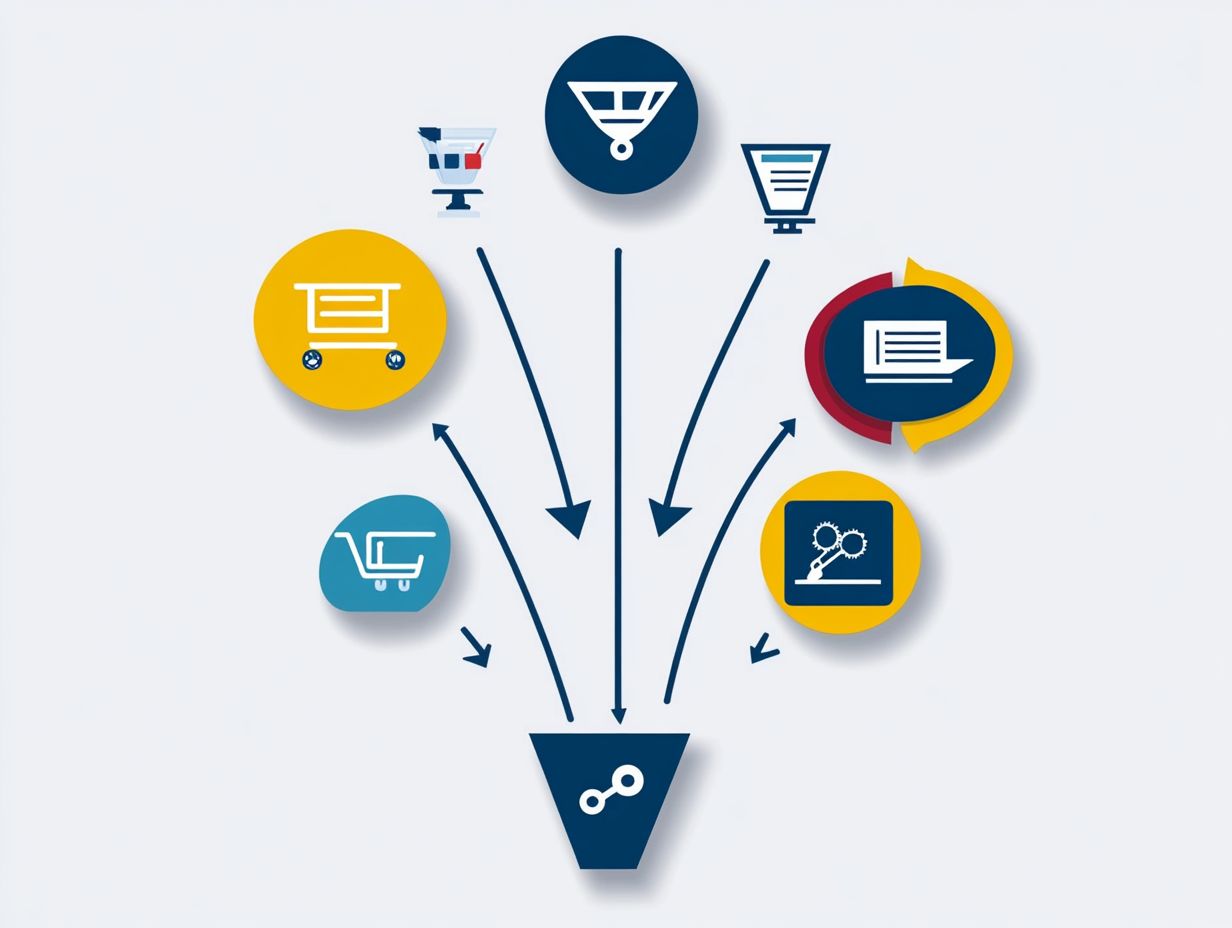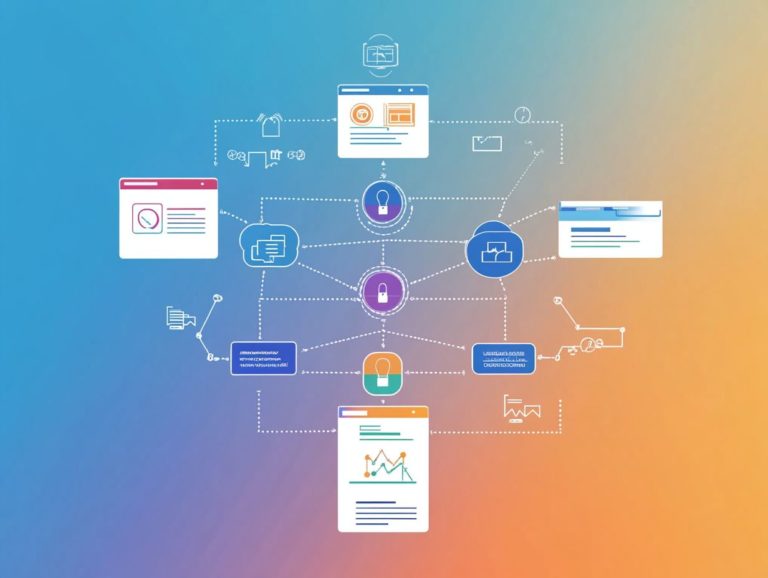5 Key Components of Effective Lead Management
Let's Set Up Your Lead Generation Strategy
Fill out the form below, and our team will get in touch with you to create a tailored solution for your business.
In today’s competitive business landscape, mastering lead management is not just beneficial; it’s essential for driving revenue growth and maximizing conversions.
Get ready to dive into five game-changing components that will elevate your lead management strategy! First, you’ll want to develop a deep understanding of your ideal customer profile, followed by implementing effective marketing campaigns for lead generation techniques.
Next, discover how to qualify and score leads so you can prioritize your efforts wisely. Nurturing leads through the sales funnel is crucial, and we’ll highlight the essential engagement metrics (data showing how customers interact with your content) for measuring your success.
Prepare to transform your approach and unlock new opportunities, leveraging data-driven insights for success!
Contents
- Key Takeaways:
- 1. Understanding Your Target Audience
- 2. Creating an Effective Lead Generation Strategy
- Let's Set Up Your Lead Generation Strategy
- 3. Qualifying and Scoring Leads
- 4. Nurturing Leads through the Sales Funnel
- 5. Analyzing and Measuring Results
- What Is Lead Management and Why Is It Important?
- Let's Set Up Your Lead Generation Strategy
- Let's Set Up Your Lead Generation Strategy
- What Metrics Should Be Used to Measure the Success of Lead Management?
- Frequently Asked Questions
- What are the 5 key components of effective lead management?
- Why is lead scoring an important component of effective lead management?
- How does lead nurturing contribute to effective lead management?
- What is the role of lead tracking in effective lead management?
- How can lead segmentation improve lead management?
- Let's Set Up Your Lead Generation Strategy
Key Takeaways:

- Understanding your target audience is crucial in effective lead management, as it helps tailor your strategies and messaging to attract and engage potential qualified leads.
- An effective lead generation strategy involves utilizing various channels, such as webinars, social media, and email campaigns, to capture and convert qualified leads into customers.
- Qualifying and scoring leads based on specific demographic information helps prioritize and focus on the most promising leads, increasing the chances of successful sales conversions.
1. Understanding Your Target Audience
Understanding your target audience is essential in today’s competitive landscape. It allows you to tailor your lead management and marketing automation strategies effectively, ensuring your sales team focuses on high-quality leads that align with your customer profile.
This not only enhances the customer journey but also boosts overall conversion potential.
By diving deep into the intricacies of demographics and firmographics (the characteristics of companies), you can uncover valuable insights about your potential customers’ preferences, challenges, and purchasing behaviors.
This intelligence guides your creation of tailored marketing outreach messages and helps you choose the right channels for sales engagement.
Analyzing customer behavior and engagement metrics enables you to refine your strategies continuously, optimizing both lead generation and nurturing processes. Ultimately, this comprehensive understanding aligns your offerings with customer expectations, resulting in more meaningful interactions and increased loyalty over time.
2. Creating an Effective Lead Generation Strategy
Creating an effective lead generation strategy is essential for driving revenue growth. It seamlessly blends targeted communication and marketing campaigns with innovative lead capture techniques, enabling you to identify and engage qualified leads across various channels.
Incorporating methods such as webinars offers an interactive platform where you not only educate potential customers but also capture their information for future engagement.
Well-designed landing pages act as crucial touchpoints, converting visitors into qualified leads by providing valuable resources in exchange for their contact details.
Email campaigns further bolster your outreach efforts by nurturing leads through personalized content, ensuring that your communication remains relevant and engaging.
By leveraging marketing automation tools, you can streamline these processes, allowing for consistent follow-ups and efficient workflow automation. This significantly reduces manual efforts, enabling you to implement a more organized lead management strategy.
Let's Set Up Your Lead Generation Strategy
Fill out the form below, and our team will get in touch with you to create a tailored solution for your business.
3. Qualifying and Scoring Leads
Qualifying and scoring leads is essential for optimizing your sales funnel. It allows you to prioritize high-quality leads based on their engagement metrics and conversion potential, enhancing your overall sales efficiency.
To implement these strategies effectively, rely on various methodologies. Assess demographic information—such as age, location, and industry—to gauge potential fit.
Utilize predictive lead scoring techniques to leverage historical data and behavior patterns for forecasting a lead’s likelihood of converting. Identifying buying signals, like website interactions and social media engagement, can further refine your process.
Adjust your lead scoring criteria as customer behaviors change. This ensures your scoring system aligns with market trends and buyer motivations, keeping you one step ahead.
4. Nurturing Leads through the Sales Funnel

Nurturing leads through the sales funnel is an ongoing journey that demands a strategic approach to engage prospects effectively. Use targeted content and personalized email campaigns to guide them toward successful sales conversions.
As potential customers transition from the awareness stage to consideration and finally to the decision-making phase, adapt your nurturing methods accordingly. In the awareness phase, broad educational content can spark interest, while later stages call for more in-depth, solution-focused resources.
Once leads enter the consideration phase, timely follow-ups from your sales team can clarify doubts and personalize interactions, significantly impacting their decision-making process.
Sales and marketing must work together to boost results! By collaborating, you ensure each lead receives the right information at just the right moment, enhancing your sales productivity and conversion potential.
5. Analyzing and Measuring Results
Analyzing and measuring results is essential for refining your lead management strategies. It provides invaluable insights into engagement metrics and tracks interactions throughout the sales cycle, driving revenue growth.
By focusing on key metrics such as email opens, lead conversions, and overall campaign effectiveness, you gain a clearer understanding of your strategies’ performance. For instance, tracking the open rates of your email campaigns helps gauge interest and identify the most compelling content.
Monitoring lead conversion rates reveals how effectively you are nurturing prospects and guiding them through their purchasing journey. Regularly analyzing these metrics allows you to recognize patterns and trends.
This paves the way for informed adjustments that elevate your future marketing efforts. The insights from this evaluation can strengthen your lead generation and nurturing strategies, creating a more resilient framework for long-term success.
What Is Lead Management and Why Is It Important?
Lead management is your organized way of capturing, tracking, and nurturing leads throughout the sales funnel. It plays a pivotal role in a comprehensive sales strategy aimed at converting qualified leads into loyal customers while enhancing your sales team’s productivity.
This process streamlines how you handle leads and ensures that your marketing efforts align with your sales strategies. When executed effectively, lead management cultivates collaboration between your marketing and sales teams, leading to improved communication and a deeper understanding of customer needs.
Let's Set Up Your Lead Generation Strategy
Fill out the form below, and our team will get in touch with you to create a tailored solution for your business.
By incorporating workflow automation—using software to help manage tasks without doing them manually—you can manage leads more efficiently. This eliminates repetitive tasks and minimizes the risk of human error.
As a result, your teams are better prepared to respond swiftly to potential opportunities, driving higher conversion rates and fostering stronger customer relationships.
How Can a Business Identify Their Ideal Target Audience?
Identifying your ideal target audience is a crucial step in lead management. It requires a careful analysis of demographics and firmographics, which are the characteristics of organizations, like company size and industry, to craft a detailed understanding of your customers that aligns seamlessly with your business objectives.
This process not only deepens your understanding of potential clients but also establishes the foundation for effective outreach and engagement strategies. You can also uncover valuable insights by conducting market research, while analyzing existing customer data allows you to pinpoint what successful interactions truly entail, enhancing your customer behavior analysis.
You can even harness the power of AI-powered tools to sift through vast amounts of information, enabling you to target more precisely by recognizing patterns that might elude traditional methods.
Ultimately, this thorough identification informs your marketing strategies, allowing for tailored messaging that resonates deeply with your chosen audience, enhances conversion rates, and cultivates long-term relationships built on solid customer profiles.
What Are the Different Lead Generation Strategies?

Explore a range of exciting lead generation strategies designed to grab your prospects’ attention! You have a wealth of lead generation strategies at your disposal, from innovative marketing campaigns to effective content delivery and targeted communication techniques, all designed to capture the attention of potential prospects.
Among these, inbound marketing truly shines by drawing clients in with valuable content and SEO-driven strategies, ultimately fostering strong and lasting relationships. On the flip side, paid advertising provides immediate visibility, allowing you to efficiently reach specific demographics and often delivers quick results when time is of the essence.
Referral programs tap into the loyalty of satisfied customers, encouraging them to recommend your products or services to their networks, significantly enhancing trust and credibility in the process.
To truly maximize the effectiveness of these strategies, pay close attention to buying signals. Recognizing these cues will enable you to tailor your approach, addressing the specific needs and readiness of potential clients.
What Criteria Should Be Used to Qualify and Score Leads?
Qualifying and scoring leads requires specific criteria that assess engagement metrics and sales readiness, ensuring you prioritize only the most promising prospects for follow-up and conversion.
Effective lead scoring means evaluating both demographic data—like age, location, and job title—and behavioral data, which includes website interactions, email opens, and content downloads. By integrating these factors, you can develop a clearer profile of potential customers.
For example, predictive lead scoring employs algorithms to analyze past buying behaviors and trends, helping you identify which leads are most likely to convert, such as those who frequently visit product pages or engage with your marketing materials.
This strategic approach enables your sales team to focus their efforts on high-quality leads, optimizing outreach and significantly enhancing conversion rates.
Let's Set Up Your Lead Generation Strategy
Fill out the form below, and our team will get in touch with you to create a tailored solution for your business.
How Can a Business Effectively Nurture Leads for Maximum Conversion?
To effectively nurture leads for maximum conversion, you must implement a strategic approach that includes personalized email campaigns and engaging content throughout the sales funnel.
This means not only crafting targeted messages but also segmenting your audience based on their behaviors and preferences. By doing this, you can tailor your communications to resonate with specific groups, addressing their unique pain points and interests.
Continuous engagement is essential; regular check-ins or updates keep potential customers informed and demonstrate your brand’s commitment to building a lasting relationship. Act now by creating personalized email campaigns to convert leads before they slip away!
By fostering trust and rapport over time, you enhance your chances of converting interested leads into loyal customers, ultimately boosting your overall sales effectiveness.
What Metrics Should Be Used to Measure the Success of Lead Management?
Measuring the success of your lead management requires analyzing specific metrics. These metrics reveal engagement levels, conversion rates, and the effectiveness of your marketing strategies.
Important metrics like lead conversion rates provide valuable insights into how well you are nurturing potential customers through the sales funnel. Engagement metrics show how much interest your target audience has in your content, guiding your future marketing initiatives.
Tracking the duration of the sales cycle gives you a clearer understanding of how long it takes to convert a lead into a customer. This helps you identify any bottlenecks in the process.
By closely monitoring these metrics, you can easily adjust your lead management strategies, optimize your marketing campaigns, and ultimately enhance your overall sales performance.
Frequently Asked Questions

What are the 5 key components of effective lead management?
The 5 key components of effective lead management are lead scoring, lead nurturing, lead tracking, lead segmentation, and lead qualification.
Why is lead scoring an important component of effective lead management?
Lead scoring allows businesses to prioritize and focus on the most promising leads. This increases the efficiency and success of their lead management efforts.
How does lead nurturing contribute to effective lead management?
Lead nurturing is about building relationships with potential customers through targeted communication. This increases the chances of converting them into customers in the long run.
What is the role of lead tracking in effective lead management?
Lead tracking helps businesses monitor and analyze the behavior and interactions of leads. This provides valuable insights for improving lead management strategies.
How can lead segmentation improve lead management?
Lead segmentation divides leads into specific groups based on characteristics, interests, or behaviors. This allows businesses to tailor their marketing efforts and messages to each group for better results.
Let's Set Up Your Lead Generation Strategy
Fill out the form below, and our team will get in touch with you to create a tailored solution for your business.
Why is lead qualification an essential component of effective lead management?
Lead qualification evaluates leads based on specific criteria to determine their readiness to make a purchase. This enables businesses to focus their efforts on the most qualified leads and maximize conversions.
Ready to improve your lead management? Start implementing these strategies today!






